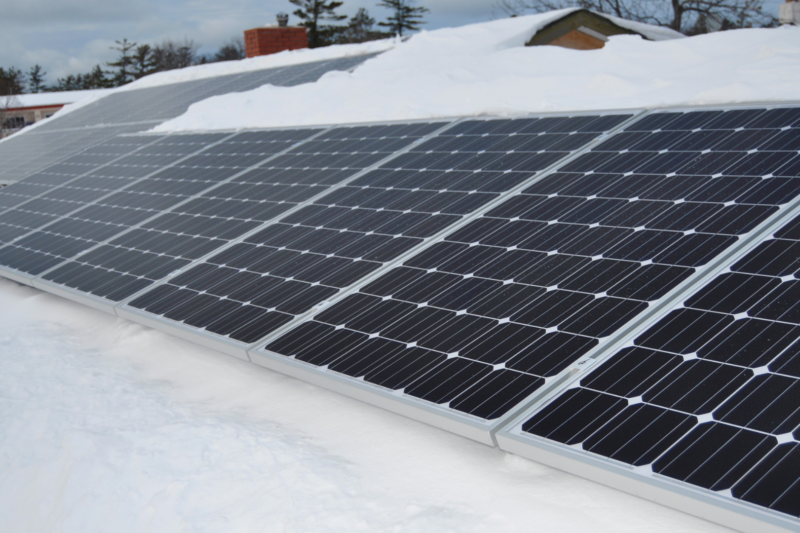All summer long, solar panels helped the UK generate an impressive 17 gigawatts (GW) of energy. By October 2024, UK solar installations were shown to have increased by 20,100, proving that even more homes and businesses are joining the solar takeover.
Despite showing their worth all year round, lots of people worry about their solar panels not working when the colder, darker months set in. What happens when sunny skies are replaced with clouds or snow?
Project Solar is here to dispel any misconceptions about wintertime solar panel efficiency.
Using research from solar experts, we can show you there’s no need to be concerned about panel productivity.
Do solar panels work in the winter?
Solar panels are still effective during the winter months, even in the UK’s colder climate.
Their operation actually depends on light rather than heat (meaning they can generate electricity throughout the year). In fact, some studies have shown that solar panels work at peak performance in winter, as they don’t have to battle high temperatures.
Then, there is something scientists have named the ‘Albedo Effect’ (fun fact: the name for this phenomenon comes from the Latin word for ‘white’!)
It describes the reflecting power of a surface and how much solar radiation it reflects into space (or, in this case, back onto solar panels).
Bright snow and ice have been found to have a higher ‘albedo’, meaning you may see a potential increase in indirect solar radiation absorption in the winter!
Do solar panels work in cloudy weather?
Yes, solar panels work in cloudy weather, too. That’s because most clouds aren’t dense enough to stop radiation from hitting your panels. Plus, solar panels don’t need constant, direct sunlight to function.
It’s more about daylight, not sunlight. Modern solar systems are capable of absorbing a spectrum of light along different wavelengths (some studies have shown that even artificial light could power a solar panel!)
It’s also worth pointing out that certain weather conditions can have unexpected effects on solar panel performance. For instance, the ‘Edge-of-Cloud‘ effect can cause brief surges in power output when sunlight is magnified around the edges of clouds.
As you can see, homes supplementing their energy with solar panels don’t need to worry about them working in winter. There’s plenty of sun to go around, even in bad weather.
What happens if your panels are snowed on?
Again, you shouldn’t be too concerned if a dusting of snow accumulates on your solar panels.
Most solar systems are installed at angles between 20-50º so that they can capture optimum levels of sunlight (the specific angle will depend on your home’s orientation and roof pitch).
Due to these angles, any fallen snow should slide off your panels or melt over time. The dark surfaces of solar panels absorb heat, which can actually accelerate the melting process even in cold conditions.
However, if your area is experiencing a record-breaking blizzard of heavy snowfall, this may not be the case. Luckily, there are plenty of ways to keep your solar panels optimised during winter!
How to optimise solar panel performance in winter
-
Keep them clean
To make sure your solar panels are working efficiently, regular maintenance is essential.
Accumulated debris (e.g., leaves, dirt, or heavy snow) can obstruct sunlight and, potentially, reduce your solar panel’s energy intake. Gently cleaning the panels with a soft brush or sponge can remove any obstructions.
Performing this task during daylight hours (when temperatures are milder) is usually more effective, as ice is less likely to form on the panel’s surface.
You should always prioritise safety; if accessing the panels is hazardous, consider hiring a professional cleaning service.
-
Monitor and maintain
Regularly inspecting your solar panels can help identify issues before they escalate.
Some domestic and commercial solar panels come with monitoring systems that track the performance of your panels. These monitors can then alert you to any significant drops in energy production that may indicate a problem.
Performing physical checks is equally important. If you spot any cracks or loose connections, especially after severe weather conditions, contact your provider immediately to prevent further damage.
-
Remove obstructions
The sun’s position in the sky during winter is lower, which can cause shadows from nearby trees to fall on your panels.
By trimming overhanging branches and removing any fallen foliage, you can be sure that your solar system is working at maximum capacity.
-
Professional check-up
Scheduling an annual inspection with a certified solar technician is a must!
Professionals can perform assessments, including electrical testing, structural integrity checks, and performance evaluations. They can also clean areas that are difficult to access and give you recommendations for upgrades!
Get your winter solar panels today!
So, do solar panels work in the winter? Absolutely, they do!
There’s never been a better time to invest in solar. Join the millions of UK homeowners and businesses getting their foot on the green ladder with Project Solar. We offer state-of-the-art solar systems backed by a reliable, lifetime warranty.
Contact us today to learn more.

